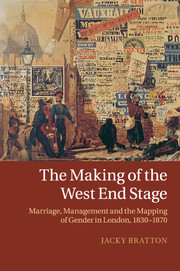 The Making of the West End Stage
The Making of the West End Stage Chapter 4 - Performing the crisis
from Part II - Making
Published online by Cambridge University Press: 05 November 2011
Summary
This book has so far attempted to bring into focus the phenomenon of West End entertainment as it came into being in the middle of the nineteenth century, seeing it as a topographical and conceptual novelty much wider than the study of the Drama has previously allowed. The second part of this book will examine the ways in which the theatre, specifically, contributed to that phenomenon, and seek to make good my assertion that women played a much greater part in the foundation of West End theatre than has previously been allowed. It will not, on the whole, treat the generation-long period on which it focusses, from 1831 to 1866, chronologically or developmentally, but this chapter will tend to concentrate upon the earlier part of the period, the rapid social evolution which saw the rise of the female players who in their maturity became the moving spirits considered in the succeeding chapters.
Asserting the rising importance of women in the theatre business in the 1830s and 1840s begs the question of why women should have moved into a powerful position there just at the point normally associated with the separation of home and workplace, leading to the binary gendering of the social and public spheres. The mapping of the domain of entertainment in the first half of this book suggests that this paradox might be thought of in terms of the anxieties associated with catering for, and participating in, the new leisure culture, fraught as it was with psychological difficulties for the expanding and various Victorian middle classes. This was a moment, one might say, of aporia: a doubtful place, a weakness in the rhetorical construction of the world. Through such stressed-out openings we may sometimes see the eruption of that which is normally held in check, or indeed that which is actively being suppressed: in this case, the freedom and power of women. Chapters 2 and 3 suggest this possibility, in that they pinpoint the ways in which gender definition became of central importance, influencing the status of the writer, the acceptability of the actor, and the self-consciousness and willingness to participate of every audience member. This chapter will seek to show how women came forward, in those circumstances, to play a leading part in the transformation of the culture of performance. It will explore their presence upon the debatable, liminal ground. Women on stage came to occupy the exposed positions that men found it difficult any longer to hold: as gentlemen became black-suited and valorised the Real, and so stiffened into postures that repudiated the play of feeling and the assumption of roles, women stepped up as ubiquitous players on the stages of the capital. They took upon themselves not only the feeling and colour assigned to their own sex, with its unashamed emotional extroversion, but also the playful roles and the brilliant costumes that men had set aside, weeping and dancing and strutting the stage in jewelled doublets and feathered hats as well as silken breeches.
- Type
- Chapter
- Information
- The Making of the West End StageMarriage, Management and the Mapping of Gender in London, 1830–1870, pp. 117 - 144Publisher: Cambridge University PressPrint publication year: 2011


